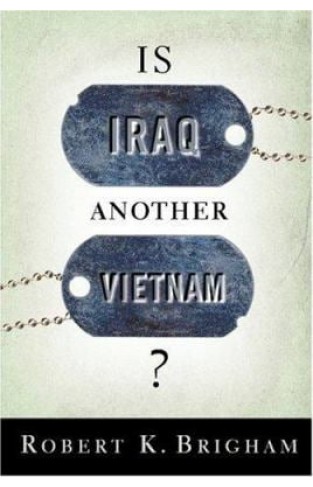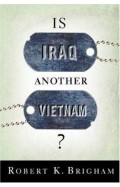Is Iraq Another Vietnam?
By: Robert K. Brigham
-
Rs 3,640.00
Due to constant currency fluctuation, prices are subject to change with or without notice.
We're offering a high
discount on this book as it is slightly damaged
Since the first days of the Iraqi invasion, supporters of the war have cautioned the public not to view this conflict as another Vietnam. They rightfully point to many important distinctions. There is no unified resistance in Iraq. No political or religious leader has been able to galvanize opposition to U.S. intervention the way that Ho Chi Minh did in Vietnam. And it is not likely that 580,000 American troops will find their way to Iraq.
However, there are two similarities that may dwarf the thousands of differences. First, in Iraq, like Vietnam, the original rationale for going to war has been discredited and public support has dwindled. Second, in both cases the new justification became building stable societies. There are enormous pitfalls in America's nation building efforts in Iraq as there were in Vietnam. But it is the business we now find ourselves in, and there is no easy retreat from it morally. As American frustration increases, some policy makers are making the deadly mistake of approaching problems in Iraq as if we are facing them for the first time. It is crucial that we apply the lessons of Vietnam wisely and selectively.
We're offering a high
discount on this book as it is slightly damaged
Since the first days of the Iraqi invasion, supporters of the war have cautioned the public not to view this conflict as another Vietnam. They rightfully point to many important distinctions. There is no unified resistance in Iraq. No political or religious leader has been able to galvanize opposition to U.S. intervention the way that Ho Chi Minh did in Vietnam. And it is not likely that 580,000 American troops will find their way to Iraq.
However, there are two similarities that may dwarf the thousands of differences. First, in Iraq, like Vietnam, the original rationale for going to war has been discredited and public support has dwindled. Second, in both cases the new justification became building stable societies. There are enormous pitfalls in America's nation building efforts in Iraq as there were in Vietnam. But it is the business we now find ourselves in, and there is no easy retreat from it morally. As American frustration increases, some policy makers are making the deadly mistake of approaching problems in Iraq as if we are facing them for the first time. It is crucial that we apply the lessons of Vietnam wisely and selectively.
Zubin Mehta: A Musical Journey (An Authorized Biography)
By: VOID - Bakhtiar K. Dadabhoy
Rs 630.00 Rs 1,050.00 Ex Tax :Rs 630.00
Manning Up: How the Rise of Women Has Turned Men into Boys
By: Kay Hymowitz
Rs 796.00 Rs 995.00 Ex Tax :Rs 796.00
No similar books from this author available at the moment.
No recently viewed books available at the moment.
Zubin Mehta: A Musical Journey (An Authorized Biography)
By: VOID - Bakhtiar K. Dadabhoy
Rs 630.00 Rs 1,050.00 Ex Tax :Rs 630.00














-120x187.jpg?q6)













